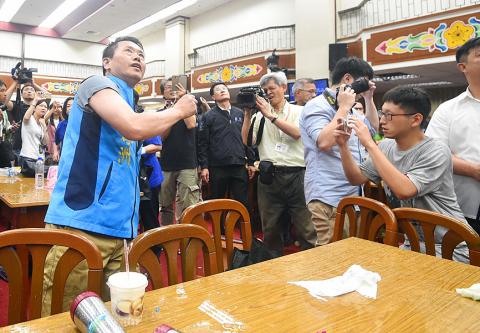The Legislative Yuan yesterday issued a letter to the Chinese-language China Times asking it to explain an incident on Wednesday last week in which one of its interns hurled water balloons at Democratic Progressive Party (DPP) lawmakers during a joint committee review of the budget for the Forward-looking Infrastructure Program.
The move came a day after the legislature said it would file charges against the intern, Han Fu-yu (韓福宇) — with video footage showing him throwing several water balloons at DPP lawmakers while filming himself using a cellphone — on suspicion of violating the Code of Criminal Procedure (刑事訴訟法) and the Social Order Maintenance Act (社會秩序維護法).
The legislature asked the China Times’ entertainment section deputy editor-in-chief, Chang Yi-wen (張怡文), who had brought Han and two other interns to the meeting, to give a thorough account of the incident, saying they had breached rules on visits to the legislature, as well as guidelines on the use of interview permits.

Photo: Liao Chen-huei, Taipei Times
“Han, who attacked the rostrum with water balloons, obstructed the proceedings and interfered with legislators exercising their authority, is suspected of having committed a serious violation,” Legislative Yuan Secretary-General Lin Chih-chia (林志嘉) said.
The China Times issued a three-point statement in response to the legislature amid speculation that Han, a Taiwanese student and recipient of a scholarship from Beijing’s Communication University of China, could be a spy working for Chinese intelligence authorities.
It is impossible that Han could be a spy for the Chinese Communist Party, as he is not a member of the Communist Youth League of China, the media outlet said.
Han once joined the Beijing Volunteer Association aimed at serving Chinese society, but he has withdrawn from the organization, it said.
It is regrettable that the incident, a young man’s impulsive act, has been exaggerated to the extent that some say it is a national security issue, it said.
“Legislators threw water balloons first and set a bad example for the interns, who were there to learn. The Legislative Yuan should take the lawmakers to court rather than hunt down a student,” the China Times said.
Chinese Nationalist Party (KMT) caucus secretary-general Lin Wei-chou (林為洲) called on the legislature not to be too severe on Han.
“We should be more tolerant of a young man’s impulsive behavior, just like how students that occupied the Executive Yuan during the Sunflower movement were treated with considerably more tolerance than they would have been treated under normal circumstances,” he said, referring to former premier Jiang Yi-huah (江宜樺) having dropped charges against Sunflower protesters.
Some netizens also drew a parallel between Han’s behavior and the Sunflower movement, accusing the DPP of applying double standards.
Others disagreed, saying they do not see the connection between the two incidents.
“If he was so upset, he could have launched a movement to occupy the legislature like they did during the Sunflower movement. Taking a selfie of yourself throwing water balloons at lawmakers shows an extreme lack of self-discipline and judgment,” a netizen said.
“Is what the Sunflower movement taught us tantamount to just three water balloons?” another said.

A Chinese aircraft carrier group entered Japan’s economic waters over the weekend, before exiting to conduct drills involving fighter jets, the Japanese Ministry of Defense said yesterday. The Liaoning aircraft carrier, two missile destroyers and one fast combat supply ship sailed about 300km southwest of Japan’s easternmost island of Minamitori on Saturday, a ministry statement said. It was the first time a Chinese aircraft carrier had entered that part of Japan’s exclusive economic zone (EEZ), a ministry spokesman said. “We think the Chinese military is trying to improve its operational capability and ability to conduct operations in distant areas,” the spokesman said. China’s growing

Taiwan yesterday denied Chinese allegations that its military was behind a cyberattack on a technology company in Guangzhou, after city authorities issued warrants for 20 suspects. The Guangzhou Municipal Public Security Bureau earlier yesterday issued warrants for 20 people it identified as members of the Information, Communications and Electronic Force Command (ICEFCOM). The bureau alleged they were behind a May 20 cyberattack targeting the backend system of a self-service facility at the company. “ICEFCOM, under Taiwan’s ruling Democratic Progressive Party, directed the illegal attack,” the warrant says. The bureau placed a bounty of 10,000 yuan (US$1,392) on each of the 20 people named in

Nine retired generals from Taiwan, Japan and the US have been invited to participate in a tabletop exercise hosted by the Taipei School of Economics and Political Science Foundation tomorrow and Wednesday that simulates a potential Chinese invasion of Taiwan in 2030, the foundation said yesterday. The five retired Taiwanese generals would include retired admiral Lee Hsi-min (李喜明), joined by retired US Navy admiral Michael Mullen and former chief of staff of the Japan Self-Defense Forces general Shigeru Iwasaki, it said. The simulation aims to offer strategic insights into regional security and peace in the Taiwan Strait, it added. Foundation chair Huang Huang-hsiung

PUBLIC WARNING: The two students had been tricked into going to Hong Kong for a ‘high-paying’ job, which sent them to a scam center in Cambodia Police warned the public not to trust job advertisements touting high pay abroad following the return of two college students over the weekend who had been trafficked and forced to work at a cyberscam center in Cambodia. The two victims, surnamed Lee (李), 18, and Lin (林), 19, were interviewed by police after landing in Taiwan on Saturday. Taichung’s Chingshui Police Precinct said in a statement yesterday that the two students are good friends, and Lin had suspended her studies after seeing the ad promising good pay to work in Hong Kong. Lee’s grandfather on Thursday reported to police that Lee had sent